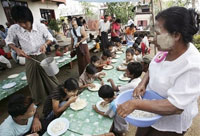Myanmar suffers from serious shortage of humanitarian aid
The international community does not provide the necessary help to almost 2.5 million victims of the recent cyclone, the United Nation says. Officials particularly said that about 390 tons of food would have to be delivered to the disaster-stricken area every day to help 750,000 victims. However, less than 300 tons of food have been distributed in Myanmar since Cyclone Nagris struck the nation on May 2-3 killing at least 43,000 people.

Hamstringing the international effort is the ruling junta's refusal to allow almost all foreign nationals into the delta area, insisting relief operations there can be handled by Myanmar nationals.
The United Nations says the regime has issued 40 visas to its staffers and another 46 to nongovernment agencies, but these personnel have been confined to the immediate Yangon area.
Among those seeking a visa is the world body's top emergency relief coordinator who U.N. Secretary-General Ban Ki-moon wants to dispatch to Myanmar.
The secretary-general's office said Thursday that John Holmes, the undersecretary-general for humanitarian affairs, will be sent to Myanmar to try to "open up more access" for U.N. relief personnel in some of the hardest-hit areas. Holmes has applied for a visa to enter Myanmar but has not yet gotten approval to visit, Ban's office said.
The official death toll from Cyclone Nargis continued to soar and 1.5 to 2.5 million survivors remained in desperate need of assistance.
The U.N. Children's Fund said Friday that of the survivors, up to 1 million children were in need of urgent assistance.
A UNICEF statement said the agency's fourth flight into Myanmar , scheduled for Saturday, would deliver several tons of food for malnourished children. Radio broadcasts have also been started to help reunite separated children with their families, it said.
Also scheduled to arrive this weekend are 2 of 10 tons of medicines and medical equipment from Israel and the American Jewish Joint Distribution Committee, said agency executive Amos Avgar.
The junta, meanwhile, announced that a constitution that critics say will cement military rule had won overwhelming support in a referendum that the junta went forward with on May 10 even though much of the country was reeling from the storm.
Also Thursday, state radio broadcast a warning of legal action against anyone hoarding or misusing aid for the victims.
Myanmar 's military, which has ruled the country for 46 years, has itself come under suspicion of diverting relief supplies, though it denies the allegation and solid evidence has yet to surface.
Tons of foreign aid - including water, blankets, mosquito nets, tarpaulins, medicines and tents - have been sent to Myanmar , but delivery has been slowed by bottlenecks, poor infrastructure and bureaucratic tangles.
New York-based Human Rights Watch said countries delivering aid to Myanmar should insist on monitoring to ensure aid reaches the cyclone victims most in need and to prevent the military government from seizing it.
The group also said it confirmed a report this week that the junta had seized high-protein biscuits supplied by the international community and distributed low-quality, locally produced substitutes to the people.
The state radio report obliquely denied the military was misappropriating aid.
"The government has systematically accepted donations and has distributed the relief goods immediately and directly to the victims," it said. "Effective legal action will be taken against those who hoard, sell or buy, use or misuse the international or local donations or relief goods or cash to the cyclone victims."
Private citizens who have attempted to bring aid from Yangon to the Irrawaddy delta, the area worst affected by the cyclone, said they have been blocked and ordered to hand over their supplies to the army, which is directing the relief operation.
The civilians, who asked not to be identified for fear of official retribution, said they didn't want to hand over their supplies because they feared they would be pilfered by the army, but had no choice.
Elisabeth Byrs, spokeswoman for the U.N. Office for the Coordination of Humanitarian Affairs, said the United Nations has been looking into the issue.
"Some aid workers visited all the major markets in Yangon to see whether they could find out anything by observations or interviewing people. They found no evidence of any sale of relief goods or hoarding or any credible report on this."
State television reported Thursday night some 43,318 fatalities from the storm, an increase of more than one-third since the beginning of the week, and almost 5,000 more than reported just a day earlier. The number of missing remained at 27,838.
The International Federation of Red Cross and Red Crescent Societies estimated Wednesday that the total death toll may be between 68,833 and 127,990. The U.N. has said more than 100,000 may have died.
The U.N. and the Red Cross say 1.6 million to 2.5 million people are in urgent need of food, water and shelter. Only 270,000 have been reached so far by aid groups.
Subscribe to Pravda.Ru Telegram channel, Facebook, RSS!





